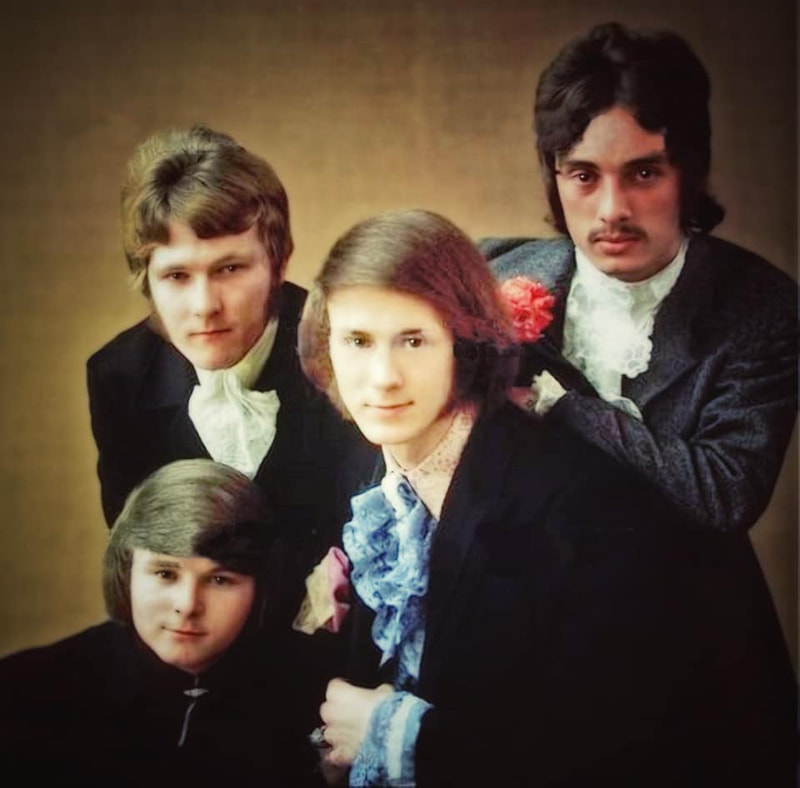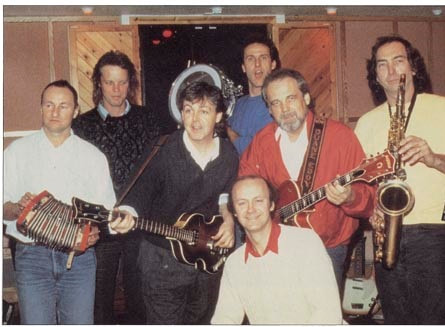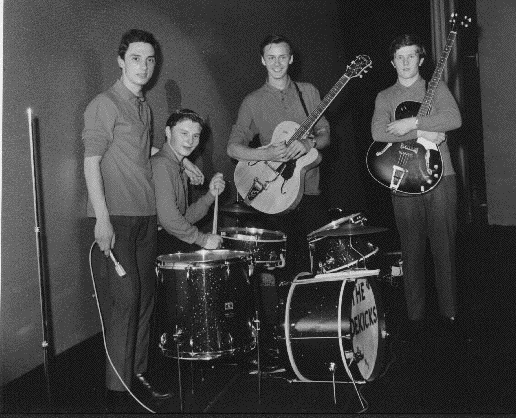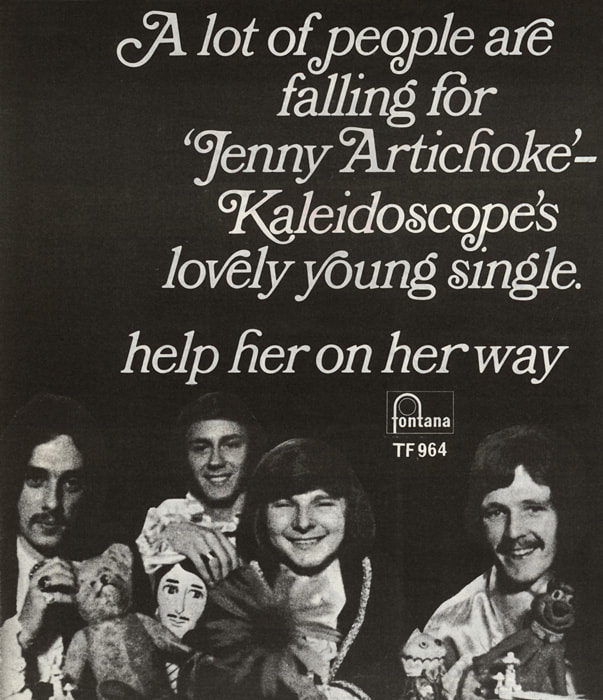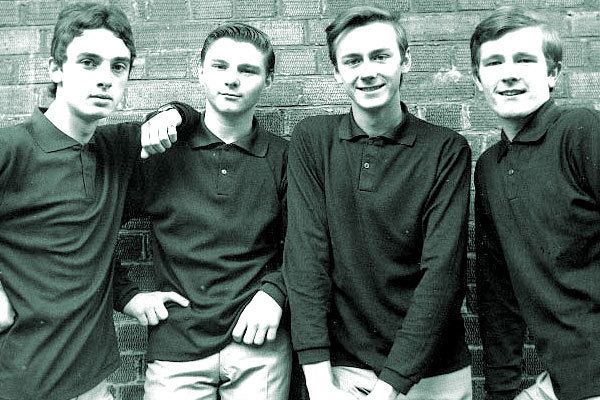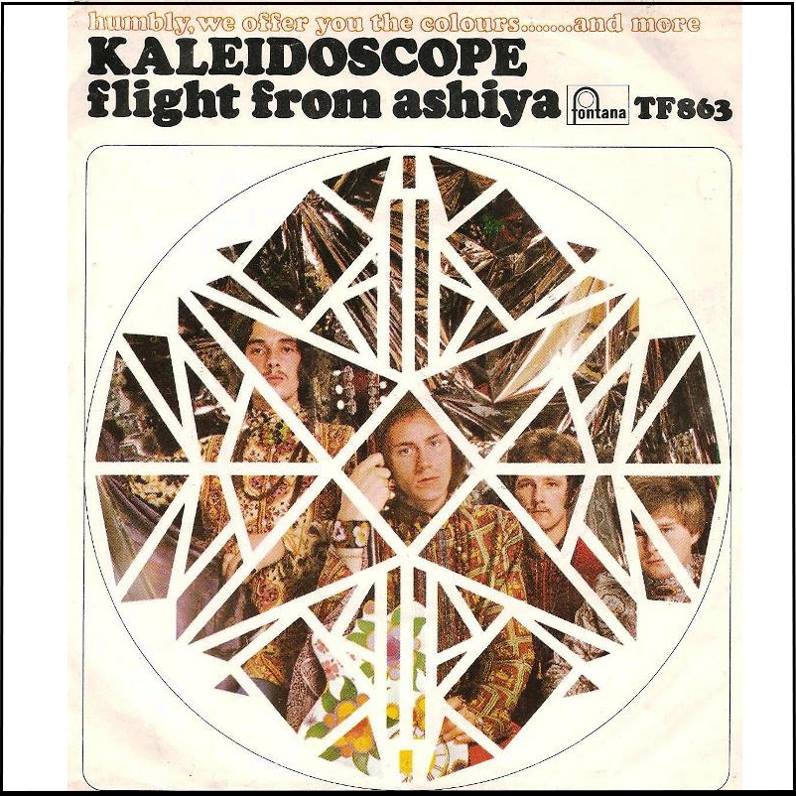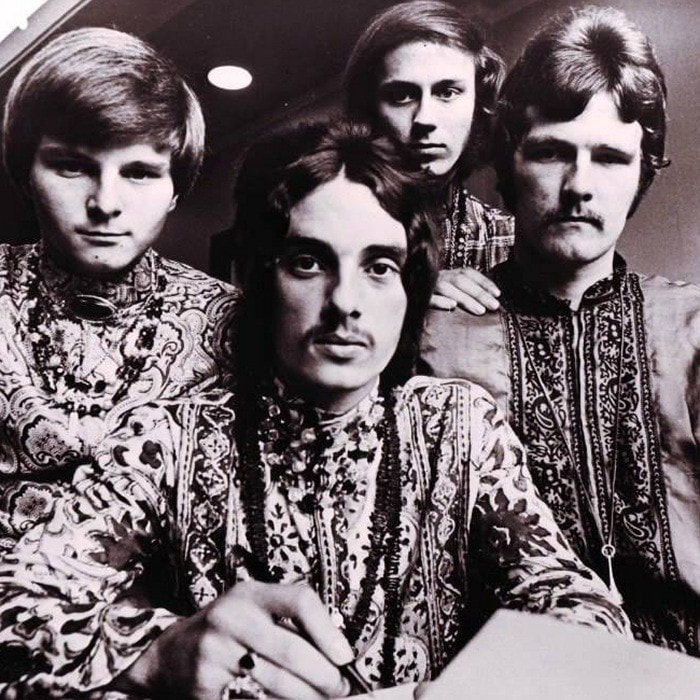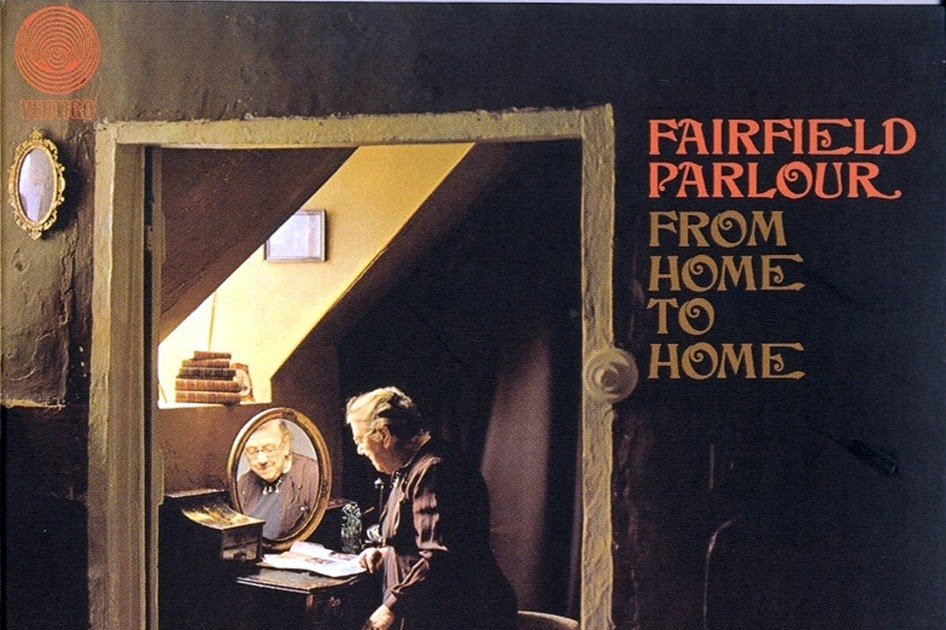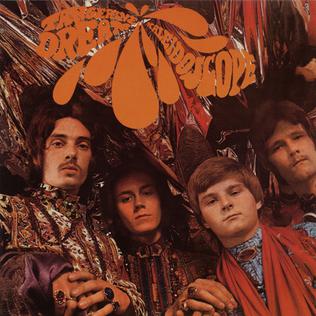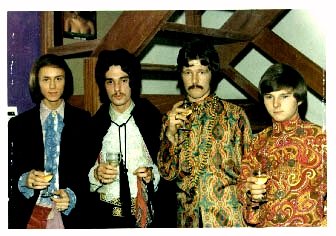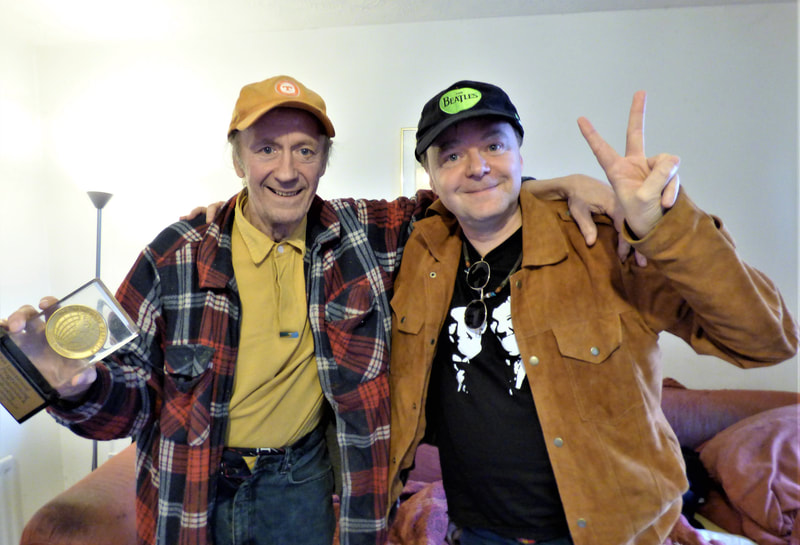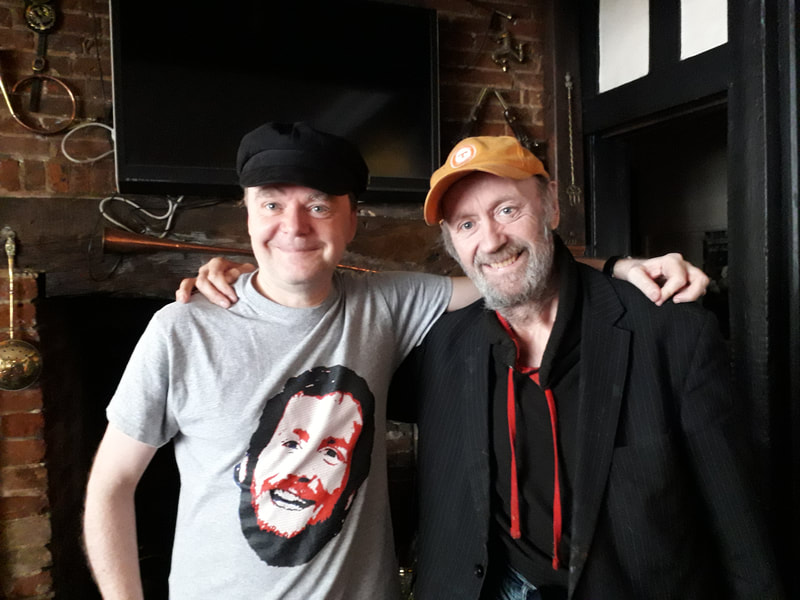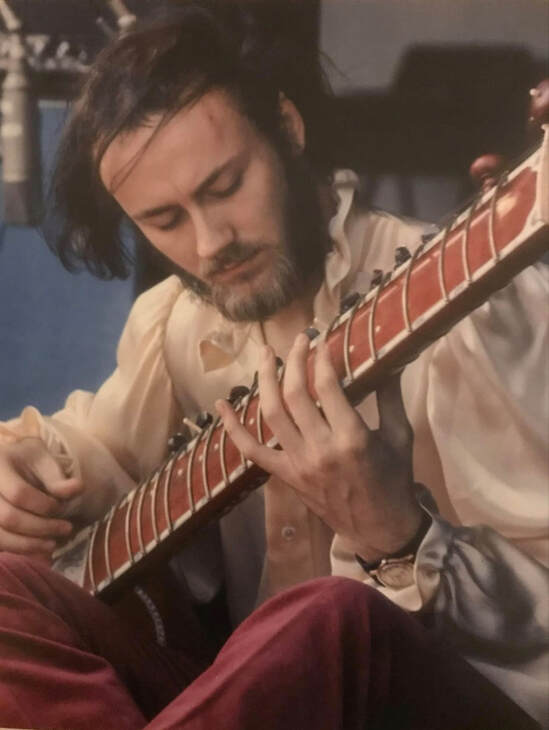
Tangerine Dreams – The Kaleidoscopic Life of Eddy Pumer by John West
Eddy Pumer was a musician, composer, and producer. He was a member of Kaleidoscope, the cult 60's band, and produced Kenny Everett at Capital Radio. He was instrumental in the success of Bohemian Rhapsody and Wuthering Heights and went on to work with Paul McCartney on several projects. He was also my friend. This is his story.
Eddy Pumer was born on October 7, 1947, in Woolwich, London. His interest in music was fueled at an early age by his parents, who were both musical and encouraged their son to be the same. Some of Eddy's earliest musical memories were of his father playing the tuba (he was a member of the Band of the Coldstream Guards and a clock repairer to the Queen) and of his mother singing in the family home.
In the 1950s, Rock 'n' Roll hit the British music scene like a bolt from the blue and Eddy was hooked from the start. Inspired by Duane Eddy, he bought a guitar and soon found that he had a natural talent for playing the instrument. In the early 60s, Eddy joined ABC Television in London as a post-boy where he met Pete Daltrey, who also worked there as a post-boy. Pete later described the young Eddy as 'tall, thin, blonde, little nose, cheeky grin, and no sense of fashion whatsoever, resplendent in an old bloke’s suedette driving coat with the required fake wool collar.' The two became friends, and Eddy asked Pete to join his band, then consisting of Eddy, Dan Brigman, and Steve Clark. Their first band as a foursome, The Sidekicks, was formed in 1963 with Pete on lead vocals, Eddy on guitar, Steve Clark on bass, and Dan Bridgman on drums. Eddy and Pete also shared song writing duties, with Pete writing the words and Eddy composing the music. Eddy was very much the Brian Jones of the group, and as Pete later recalled, he could play almost anything from the sitar to the cello.
The band gained a large local following and once supported The Who at the Welsh Harp in Hendon. Both Eddy and Pete were shocked to see Pete Townsend, as part of his stage act, smash up his guitar on stage – something that neither Eddy nor Pete could bring themselves to do with their own precious instruments!
The band changed their name to The Key in November 1965 before Eddy settled on the name Kaleidoscope when they signed a deal with Fontana Records in January 1967 after receiving help from music publisher Dick Leahy. Both Eddy and Pete later cited the Beatles as a big influence on their musical development, with Revolver and Sgt. Pepper being singled out for particular praise.
Kaleidoscope's first single, Flight from Ashiya, was released on September 15, 1967. The single received critical acclaim and a large amount of airplay on the BBC but failed to chart. This was due in part to Fontana's poor distribution network, which meant that many record stores could not get the record. The band's debut album, Tangerine Dream, was released in November of the same year. Leahy acted as the group's producer and encouraged the band to push boundaries and experiment in the studio. The album received good reviews and was championed on air by Kenny Everett, who also attended some of the band's BBC radio sessions (in 2003, the independent record label Circle released these BBC recordings on an album called Please Listen To The Pictures). Tangerine Dream failed to chart thanks to lack of promotion from Fontana and continued problems with distribution. Despite this, it is now regarded as a classic of psychedelia and has been compared to Nirvana's The Story of Simon Simopath and Pink Floyd's The Piper at the Gates of Dawn. Q Magazine ranked it as one of the greatest psychedelic albums.
Sky Children from Tangerine Dream - www.youtube.com/watch?v=HEXwUTuRwAU
A link to the band's only surviving TV performance - www.youtube.com/watch?v=nlXN6ITZXGI
Eddy was always amused by being described as a psychedelic musician, as he had never smoked pot or indulged in LSD. He reasoned that you did not need to take drugs to imagine the weird and the fantastical, and so he stayed clear of them his whole life. Despite this, some still assume, to this day, that the album was written under the influence of LSD, a claim that Pete Daltrey also refutes.
A new single was released in 1968 called Jenny Artichoke that was inspired by Donovan's, Jennifer Juniper. After its release, the band toured Europe and, in the Netherlands, supported Country Joe and The Fish. Faintly Blowing, their second album, again produced by Leahy, was released in April 1969. This time, the band's sound was heavier, but the tracks still included psychedelic elements. It also failed to reach the charts. After the poor sales of Faintly Blowing, they released two more singles in 1969: Do It Again for Jeffrey and Balloon. Both again failed to chart.
A link to Jenny Artichoke - www.youtube.com/watch?v=eCoZuHboftw
In 1970, the band left Fontana and changed their name to Fairfield Parlour. Eddy resisted the name change but finally agreed with his fellow band members in the hope that a rebrand would bring them chart success. Their new manager, DJ David Symonds, whom they met during their BBC sessions, signed them to the Vertigo label. The band's first single as Fairfield Parlour, Bordeaux Rosé, was released on April 17, 1970. It got a considerable amount of radio airplay but again failed to chart. After releasing another UK single, the album From Home to Home was released on August 14, 1970 with Symonds acting as producer. The album also featured the then-unknown singer Elton John on the track Just Another Day.
A link to a track from the album From Home to Home, The Glorious House of Arthur - www.youtube.com/watch?v=y7-KupiIslk
While the band was getting ready to release the album, they again used another name for themselves, I Luv Wight, as they had been asked to record the theme tune for the Isle of Wight Festival. Let the World Wash In was issued a week after the release of From Home to Home. They were also asked to open the festival as Fairfield Parlour. The band had high hopes for the single, but the compere of the festival decided to announce to the 500,000-strong audience that he hated the song before flinging the single into the audience. It had also been promised that the single would be played between acts, but this agreement was ignored. The record sank without trace.
1970 also saw the band provide the music for the film Eyewitness which starred Mark Lester, Susan George, and Lionel Jeffries. The film was co-written by Bryan Forbes and was one of the first he commissioned after taking over EMI Films. Eddy and Pete wrote the theme song, with Eddy writing the incidental music.
The band's fourth album, White Faced Lady, which they financed independently, was recorded at Morgan Studios in London with the help of Mike Pinder of the Moody Blues. A deal with CBS to distribute the album failed, and it was shelved until 1991, when it was finally released under the name Kaleidoscope on an independent label.
Eddy always regarded White Faced Lady as their best long-player. It was a concept album that told the story of a pale-skinned girl named Angel who rose to fame as a movie star before dying in tragic circumstances. Many of the songs are tied together by brief musical segues. The album was reportedly inspired by the life of Marilyn Monroe.
The band decided to call it a day after a concert in Bremen, Germany, in 1972. Steve Clark was to die tragically in a road traffic accident in 1999.
Following the demise of the band, Eddy moved into radio production and went to Capital Radio for an interview, after being recommended to them as a producer by David Symonds. Eddy impressed the interviewer by stating that his favourite English composer was Vaughan Williams – an opinion that the interviewer happened to share. The job was his.
Eddy found himself producing the likes of Michael Aspel, Alan Freeman, and Gerald Harper. The legendary Kenny Everett was another of Eddy's DJs, and the two quickly formed a close friendship, both finding that they shared the same sense of humour. Eddy later looked back at his time working with Kenny as some of his happiest at Capital. He regarded Kenny as unique on the radio due to his unpredictability and knack of finding the weird and the wonderful to play on air. On one memorable occasion, Kenny gave Eddy the acetate of a song. The record company was not keen to release it, as they considered it non-commercial. The band's lead singer had brought it in and asked if they could feature it on Kenny's show.
As Eddy later recalled to me in an interview a year before he died, 'I played it on the turntable and just couldn't believe what I was hearing. It was mind-blowing. I'd never heard anything quite like it. I told Kenny that we had to play it, and we did …. several times during the show! The Capital switchboard lit up for the rest of the day with people asking where people could buy it. The record company was forced to release it. And what was the song? ….. it was Bohemian Rhapsody by Queen.'
History was to repeat itself in 1977 with another single called Wuthering Heights by an unknown singer called Kate Bush. The record company favoured releasing James and the Cold Gun, but Kate stuck to her guns – excuse the pun - and insisted that Wuthering Heights should be her first single.
Demo copies of Wuthering Heights were pressed, and one of these was sent to Eddy by mistake. He was captivated by Kate's voice on his first hearing and had the disc played on air by DJ Tony Myatt, who was also convinced that it would be a hit; the other DJs on the station were not so sure. Despite this, Wuthering Heights was played throughout November and December of 1977 on the station. Eddy recalled how the station was swamped with requests on how to get the song, and any lingering doubts that EMI had about its release were quickly forgotten.
Eddy left Capital in the early 1980s and joined Music Box, the pan-European version of MTV, as music director. He was also a regular consultant for London's Melody Radio. He then returned to Capital for three more years, producing Chris Tarrant and other DJs. He also produced a series of programmes for the station featuring Sir George Martin, the legendary Beatles producer. Despite continued success as a producer, Eddy became disillusioned with commercial radio, feeling that 'the men in suits' were taking over and putting profit before creativity. He finally left the station to pursue other musical interests.
1986 saw Eddy invited by rock guitarist Duane Eddy to help produce his next album. Eddy had known Duane for some years and soon found himself linking up with the Art of Noise, to make a high-tech revival of Duane's classic Peter Gunn, which became a top ten hit.
A link to Peter Gunn and the Art of Noise - www.youtube.com/watch?v=tK-vUY6erQU
Other sessions saw Duane and Eddy play with George Harrison and Jeff Lynne. He also found himself heading to Paul McCartney's studio with Duane for a re-recording of Paul's Rockestra Theme. The track was released as a single by Capitol in 1987. 'It was a wonderful session', Eddy later recalled. 'Paul wrote a new middle-eight for the track, in order that Duane could pluck on that famous E string. We all had a lot of fun, and then we went back again the next day to see Paul mix it. It was quite a thrill.'
In 1995, Eddy was approached by Paul McCartney's promotion man about an idea that Paul had to host his own radio show. Paul knew all about Eddy's reputation as a radio producer, and when he heard that Eddy had produced Kenny Everett, he decided to offer Eddy the job. The show was called Oobu Joobu. The initial idea was to produce six shows – later extended to fifteen - with Paul acting as the DJ with jingles, chat, outtakes from his Beatles, Wings, and solo days, plus music from the likes of Buddy Holly, Little Richard, The Beach Boys, The Who, and John Lennon. Eddy also composed many of the jingles. The award-winning radio series went to Number one in the USA.
A link to Oobu Joobu - www.youtube.com/watch?v=nHPNcaBxqTo
Eddy's collaboration with Paul was to prove fruitful. Over the next few years, Eddy produced interviews for Run Devil Run, Flaming Pie, Working Classical, and the 25th anniversary edition of Band on the Run. Paul's Young Boy, The World Tonight, and Beautiful Night singles also featured tracks comprising extracts from the Oobu Joobu radio series.
Eddy also worked on Yellow Submarine, a two-hour radio show to commemorate the 30th anniversary of the film, which featured new interviews by Paul McCartney, Ringo Starr, and George Harrison. In conjunction with the Beatles TV Anthology, Eddy created a series of audio shows to document the life and times of the band for Apple. He found listening to and editing archive interviews with John Lennon particularly poignant, as he had always wanted to meet and work with the founder member of The Beatles.
Eddy also composed, produced, and orchestrated jingles for Southern Sound, Music Box, and London's Capital Radio in association with Sir George Martin. He also produced a number of the world's top orchestras for radio and wrote music for television, commercials, and video. He was an associate member of the British Academy of Composers and Song Writers.
Mark Lewisohn, the author and music historian, described Eddy during his time working with Paul McCartney, as 'an honest, hard-working, polite individual, dedicated to his work and to music, and liked by all'. I can safely say that these words are something that all those who worked with Eddy would agree with.
Eddy's final years were spent in the Suffolk town of Bungay. He died on September 22, 2020. He is survived by his daughters, Elizabeth and Ellen. Copyright: John West
Eddy Pumer was a musician, composer, and producer. He was a member of Kaleidoscope, the cult 60's band, and produced Kenny Everett at Capital Radio. He was instrumental in the success of Bohemian Rhapsody and Wuthering Heights and went on to work with Paul McCartney on several projects. He was also my friend. This is his story.
Eddy Pumer was born on October 7, 1947, in Woolwich, London. His interest in music was fueled at an early age by his parents, who were both musical and encouraged their son to be the same. Some of Eddy's earliest musical memories were of his father playing the tuba (he was a member of the Band of the Coldstream Guards and a clock repairer to the Queen) and of his mother singing in the family home.
In the 1950s, Rock 'n' Roll hit the British music scene like a bolt from the blue and Eddy was hooked from the start. Inspired by Duane Eddy, he bought a guitar and soon found that he had a natural talent for playing the instrument. In the early 60s, Eddy joined ABC Television in London as a post-boy where he met Pete Daltrey, who also worked there as a post-boy. Pete later described the young Eddy as 'tall, thin, blonde, little nose, cheeky grin, and no sense of fashion whatsoever, resplendent in an old bloke’s suedette driving coat with the required fake wool collar.' The two became friends, and Eddy asked Pete to join his band, then consisting of Eddy, Dan Brigman, and Steve Clark. Their first band as a foursome, The Sidekicks, was formed in 1963 with Pete on lead vocals, Eddy on guitar, Steve Clark on bass, and Dan Bridgman on drums. Eddy and Pete also shared song writing duties, with Pete writing the words and Eddy composing the music. Eddy was very much the Brian Jones of the group, and as Pete later recalled, he could play almost anything from the sitar to the cello.
The band gained a large local following and once supported The Who at the Welsh Harp in Hendon. Both Eddy and Pete were shocked to see Pete Townsend, as part of his stage act, smash up his guitar on stage – something that neither Eddy nor Pete could bring themselves to do with their own precious instruments!
The band changed their name to The Key in November 1965 before Eddy settled on the name Kaleidoscope when they signed a deal with Fontana Records in January 1967 after receiving help from music publisher Dick Leahy. Both Eddy and Pete later cited the Beatles as a big influence on their musical development, with Revolver and Sgt. Pepper being singled out for particular praise.
Kaleidoscope's first single, Flight from Ashiya, was released on September 15, 1967. The single received critical acclaim and a large amount of airplay on the BBC but failed to chart. This was due in part to Fontana's poor distribution network, which meant that many record stores could not get the record. The band's debut album, Tangerine Dream, was released in November of the same year. Leahy acted as the group's producer and encouraged the band to push boundaries and experiment in the studio. The album received good reviews and was championed on air by Kenny Everett, who also attended some of the band's BBC radio sessions (in 2003, the independent record label Circle released these BBC recordings on an album called Please Listen To The Pictures). Tangerine Dream failed to chart thanks to lack of promotion from Fontana and continued problems with distribution. Despite this, it is now regarded as a classic of psychedelia and has been compared to Nirvana's The Story of Simon Simopath and Pink Floyd's The Piper at the Gates of Dawn. Q Magazine ranked it as one of the greatest psychedelic albums.
Sky Children from Tangerine Dream - www.youtube.com/watch?v=HEXwUTuRwAU
A link to the band's only surviving TV performance - www.youtube.com/watch?v=nlXN6ITZXGI
Eddy was always amused by being described as a psychedelic musician, as he had never smoked pot or indulged in LSD. He reasoned that you did not need to take drugs to imagine the weird and the fantastical, and so he stayed clear of them his whole life. Despite this, some still assume, to this day, that the album was written under the influence of LSD, a claim that Pete Daltrey also refutes.
A new single was released in 1968 called Jenny Artichoke that was inspired by Donovan's, Jennifer Juniper. After its release, the band toured Europe and, in the Netherlands, supported Country Joe and The Fish. Faintly Blowing, their second album, again produced by Leahy, was released in April 1969. This time, the band's sound was heavier, but the tracks still included psychedelic elements. It also failed to reach the charts. After the poor sales of Faintly Blowing, they released two more singles in 1969: Do It Again for Jeffrey and Balloon. Both again failed to chart.
A link to Jenny Artichoke - www.youtube.com/watch?v=eCoZuHboftw
In 1970, the band left Fontana and changed their name to Fairfield Parlour. Eddy resisted the name change but finally agreed with his fellow band members in the hope that a rebrand would bring them chart success. Their new manager, DJ David Symonds, whom they met during their BBC sessions, signed them to the Vertigo label. The band's first single as Fairfield Parlour, Bordeaux Rosé, was released on April 17, 1970. It got a considerable amount of radio airplay but again failed to chart. After releasing another UK single, the album From Home to Home was released on August 14, 1970 with Symonds acting as producer. The album also featured the then-unknown singer Elton John on the track Just Another Day.
A link to a track from the album From Home to Home, The Glorious House of Arthur - www.youtube.com/watch?v=y7-KupiIslk
While the band was getting ready to release the album, they again used another name for themselves, I Luv Wight, as they had been asked to record the theme tune for the Isle of Wight Festival. Let the World Wash In was issued a week after the release of From Home to Home. They were also asked to open the festival as Fairfield Parlour. The band had high hopes for the single, but the compere of the festival decided to announce to the 500,000-strong audience that he hated the song before flinging the single into the audience. It had also been promised that the single would be played between acts, but this agreement was ignored. The record sank without trace.
1970 also saw the band provide the music for the film Eyewitness which starred Mark Lester, Susan George, and Lionel Jeffries. The film was co-written by Bryan Forbes and was one of the first he commissioned after taking over EMI Films. Eddy and Pete wrote the theme song, with Eddy writing the incidental music.
The band's fourth album, White Faced Lady, which they financed independently, was recorded at Morgan Studios in London with the help of Mike Pinder of the Moody Blues. A deal with CBS to distribute the album failed, and it was shelved until 1991, when it was finally released under the name Kaleidoscope on an independent label.
Eddy always regarded White Faced Lady as their best long-player. It was a concept album that told the story of a pale-skinned girl named Angel who rose to fame as a movie star before dying in tragic circumstances. Many of the songs are tied together by brief musical segues. The album was reportedly inspired by the life of Marilyn Monroe.
The band decided to call it a day after a concert in Bremen, Germany, in 1972. Steve Clark was to die tragically in a road traffic accident in 1999.
Following the demise of the band, Eddy moved into radio production and went to Capital Radio for an interview, after being recommended to them as a producer by David Symonds. Eddy impressed the interviewer by stating that his favourite English composer was Vaughan Williams – an opinion that the interviewer happened to share. The job was his.
Eddy found himself producing the likes of Michael Aspel, Alan Freeman, and Gerald Harper. The legendary Kenny Everett was another of Eddy's DJs, and the two quickly formed a close friendship, both finding that they shared the same sense of humour. Eddy later looked back at his time working with Kenny as some of his happiest at Capital. He regarded Kenny as unique on the radio due to his unpredictability and knack of finding the weird and the wonderful to play on air. On one memorable occasion, Kenny gave Eddy the acetate of a song. The record company was not keen to release it, as they considered it non-commercial. The band's lead singer had brought it in and asked if they could feature it on Kenny's show.
As Eddy later recalled to me in an interview a year before he died, 'I played it on the turntable and just couldn't believe what I was hearing. It was mind-blowing. I'd never heard anything quite like it. I told Kenny that we had to play it, and we did …. several times during the show! The Capital switchboard lit up for the rest of the day with people asking where people could buy it. The record company was forced to release it. And what was the song? ….. it was Bohemian Rhapsody by Queen.'
History was to repeat itself in 1977 with another single called Wuthering Heights by an unknown singer called Kate Bush. The record company favoured releasing James and the Cold Gun, but Kate stuck to her guns – excuse the pun - and insisted that Wuthering Heights should be her first single.
Demo copies of Wuthering Heights were pressed, and one of these was sent to Eddy by mistake. He was captivated by Kate's voice on his first hearing and had the disc played on air by DJ Tony Myatt, who was also convinced that it would be a hit; the other DJs on the station were not so sure. Despite this, Wuthering Heights was played throughout November and December of 1977 on the station. Eddy recalled how the station was swamped with requests on how to get the song, and any lingering doubts that EMI had about its release were quickly forgotten.
Eddy left Capital in the early 1980s and joined Music Box, the pan-European version of MTV, as music director. He was also a regular consultant for London's Melody Radio. He then returned to Capital for three more years, producing Chris Tarrant and other DJs. He also produced a series of programmes for the station featuring Sir George Martin, the legendary Beatles producer. Despite continued success as a producer, Eddy became disillusioned with commercial radio, feeling that 'the men in suits' were taking over and putting profit before creativity. He finally left the station to pursue other musical interests.
1986 saw Eddy invited by rock guitarist Duane Eddy to help produce his next album. Eddy had known Duane for some years and soon found himself linking up with the Art of Noise, to make a high-tech revival of Duane's classic Peter Gunn, which became a top ten hit.
A link to Peter Gunn and the Art of Noise - www.youtube.com/watch?v=tK-vUY6erQU
Other sessions saw Duane and Eddy play with George Harrison and Jeff Lynne. He also found himself heading to Paul McCartney's studio with Duane for a re-recording of Paul's Rockestra Theme. The track was released as a single by Capitol in 1987. 'It was a wonderful session', Eddy later recalled. 'Paul wrote a new middle-eight for the track, in order that Duane could pluck on that famous E string. We all had a lot of fun, and then we went back again the next day to see Paul mix it. It was quite a thrill.'
In 1995, Eddy was approached by Paul McCartney's promotion man about an idea that Paul had to host his own radio show. Paul knew all about Eddy's reputation as a radio producer, and when he heard that Eddy had produced Kenny Everett, he decided to offer Eddy the job. The show was called Oobu Joobu. The initial idea was to produce six shows – later extended to fifteen - with Paul acting as the DJ with jingles, chat, outtakes from his Beatles, Wings, and solo days, plus music from the likes of Buddy Holly, Little Richard, The Beach Boys, The Who, and John Lennon. Eddy also composed many of the jingles. The award-winning radio series went to Number one in the USA.
A link to Oobu Joobu - www.youtube.com/watch?v=nHPNcaBxqTo
Eddy's collaboration with Paul was to prove fruitful. Over the next few years, Eddy produced interviews for Run Devil Run, Flaming Pie, Working Classical, and the 25th anniversary edition of Band on the Run. Paul's Young Boy, The World Tonight, and Beautiful Night singles also featured tracks comprising extracts from the Oobu Joobu radio series.
Eddy also worked on Yellow Submarine, a two-hour radio show to commemorate the 30th anniversary of the film, which featured new interviews by Paul McCartney, Ringo Starr, and George Harrison. In conjunction with the Beatles TV Anthology, Eddy created a series of audio shows to document the life and times of the band for Apple. He found listening to and editing archive interviews with John Lennon particularly poignant, as he had always wanted to meet and work with the founder member of The Beatles.
Eddy also composed, produced, and orchestrated jingles for Southern Sound, Music Box, and London's Capital Radio in association with Sir George Martin. He also produced a number of the world's top orchestras for radio and wrote music for television, commercials, and video. He was an associate member of the British Academy of Composers and Song Writers.
Mark Lewisohn, the author and music historian, described Eddy during his time working with Paul McCartney, as 'an honest, hard-working, polite individual, dedicated to his work and to music, and liked by all'. I can safely say that these words are something that all those who worked with Eddy would agree with.
Eddy's final years were spent in the Suffolk town of Bungay. He died on September 22, 2020. He is survived by his daughters, Elizabeth and Ellen. Copyright: John West
